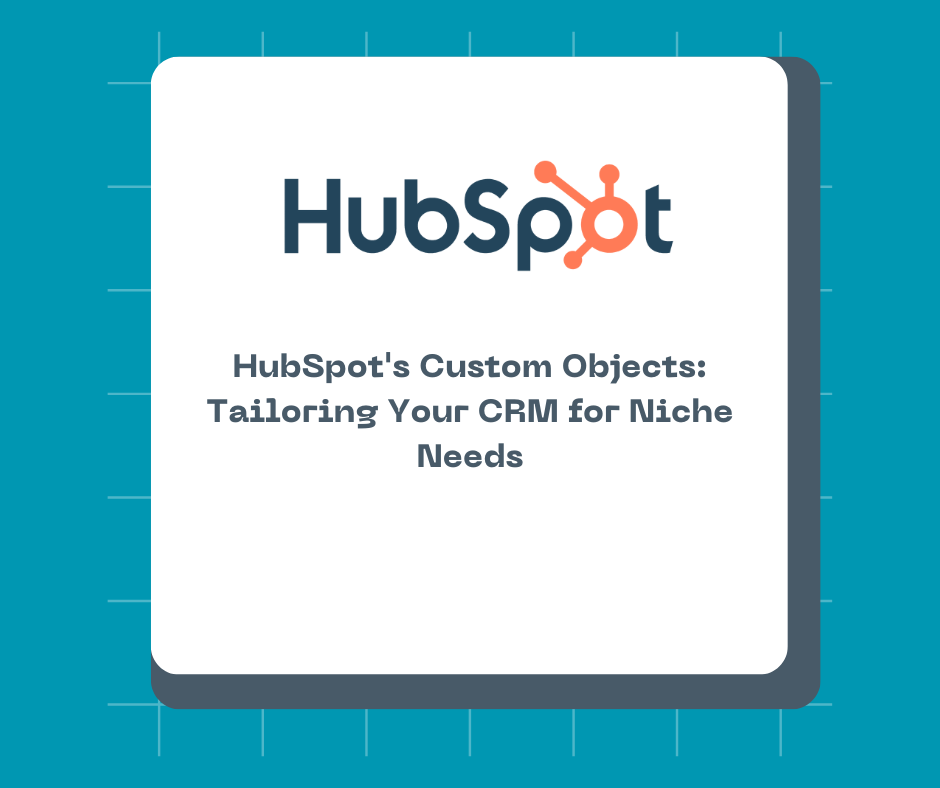In the realm of customer relationship management (CRM) software, customization is key. Every business has unique needs and workflows, and CRM platforms like HubSpot recognize this by offering customizable features to tailor the system to specific requirements. One such feature is HubSpot's Custom Objects, a powerful tool that allows businesses to extend the capabilities of their CRM beyond standard contact, company, deal, and ticket records. In this article, we'll explore the concept of Custom Objects in HubSpot and how they can be utilized to cater to niche needs, providing businesses with the flexibility and scalability required to succeed in today's competitive landscape.
Understanding Custom Objects in HubSpot
HubSpot's Custom Objects feature enables businesses to create and manage custom data records within their CRM. While standard objects like contacts, companies, deals, and tickets cover most of the typical CRM use cases, Custom Objects allow businesses to capture and store additional information that is specific to their unique requirements. This could include anything from products, projects, memberships, to specialized entities relevant to their industry or business model.
Tailoring Your CRM for Niche Needs
Custom Objects in HubSpot empower businesses to tailor their CRM to address niche needs and workflows that may not be adequately supported by standard CRM objects. Here's how Custom Objects can be utilized to cater to specific requirements:
1. Industry-Specific Data
Different industries have unique data requirements that may not be fully addressed by standard CRM objects. For example, a manufacturing company may need to track product specifications and inventory levels, while a healthcare provider may need to manage patient records and treatment plans. Custom Objects allow businesses to create tailored data structures to accommodate industry-specific information and workflows.
2. Specialized Processes
Some businesses have specialized processes that involve multiple stages or complex relationships between entities. For example, a software company may need to manage the development lifecycle of software products, including feature requests, development tasks, and release cycles. Custom Objects enable businesses to create custom data records to represent these processes and track progress more effectively within their CRM.
3. Membership or Subscription Management
Businesses that offer membership or subscription-based services may need to track detailed information about their members or subscribers, such as subscription plans, renewal dates, and payment history. Custom Objects allow businesses to create custom data records to manage membership or subscription information within their CRM, streamlining processes and improving visibility into customer relationships.
4. Project Management
Project-based businesses, such as agencies or consulting firms, may need to track project details, milestones, and deliverables for their clients. Custom Objects enable businesses to create custom data records to represent projects and associated tasks within their CRM, facilitating project management and collaboration among team members.
5. Event Management
Businesses that host events or conferences may need to manage attendee registrations, session schedules, and event logistics. Custom Objects allow businesses to create custom data records to represent events and related information within their CRM, making it easier to track registrations, communicate with attendees, and measure the success of their events.
Benefits of Custom Objects in HubSpot
Custom Objects offer several benefits for businesses looking to tailor their CRM for niche needs:
-
Flexibility: Custom Objects provide businesses with the flexibility to capture and store additional information that is specific to their unique requirements, enabling them to adapt their CRM to changing business needs.
-
Scalability: As businesses grow and evolve, their data management needs may become more complex. Custom Objects allow businesses to scale their CRM solution to accommodate increasing data volumes and diverse workflows.
-
Improved Data Management: By centralizing all relevant data within their CRM, businesses can improve data visibility, accuracy, and accessibility, leading to better decision-making and customer insights.
-
Enhanced Productivity: Custom Objects streamline processes and workflows by providing users with access to all relevant information within a single platform, reducing the need for manual data entry and minimizing errors.
Best Practices for Implementing Custom Objects in HubSpot
To maximize the benefits of Custom Objects in HubSpot, businesses should follow these best practices:
-
Define Requirements: Clearly define your business requirements and objectives before creating Custom Objects to ensure that they align with your organization's goals and workflows.
-
Plan Data Structure: Take the time to plan and design the data structure for your Custom Objects, including fields, relationships, and permissions, to ensure that it meets your current and future needs.
-
Train Users: Provide training and support to users to ensure that they understand how to use Custom Objects effectively and maximize their value within the CRM.
-
Regular Maintenance: Regularly review and update your Custom Objects to ensure that they remain aligned with your evolving business needs and processes.
-
Monitor Performance: Monitor the performance of your Custom Objects, including data quality, usage metrics, and user feedback, to identify areas for improvement and optimization.
Conclusion
Custom Objects in HubSpot offer businesses the flexibility and scalability they need to tailor their CRM for niche needs and unique workflows. By creating custom data records to represent specialized entities and processes, businesses can improve data management, streamline workflows, and drive better business outcomes. Whether you're managing industry-specific data, specialized processes, membership or subscription information, project details, or event registrations, Custom Objects empower businesses to create a CRM solution that meets their specific requirements and supports their growth and success. Embrace the power of Custom Objects in HubSpot and unlock new opportunities for customization, efficiency, and innovation in your CRM strategy.
Schedule your training session here and comment “Need Training” on the request form.

Comments